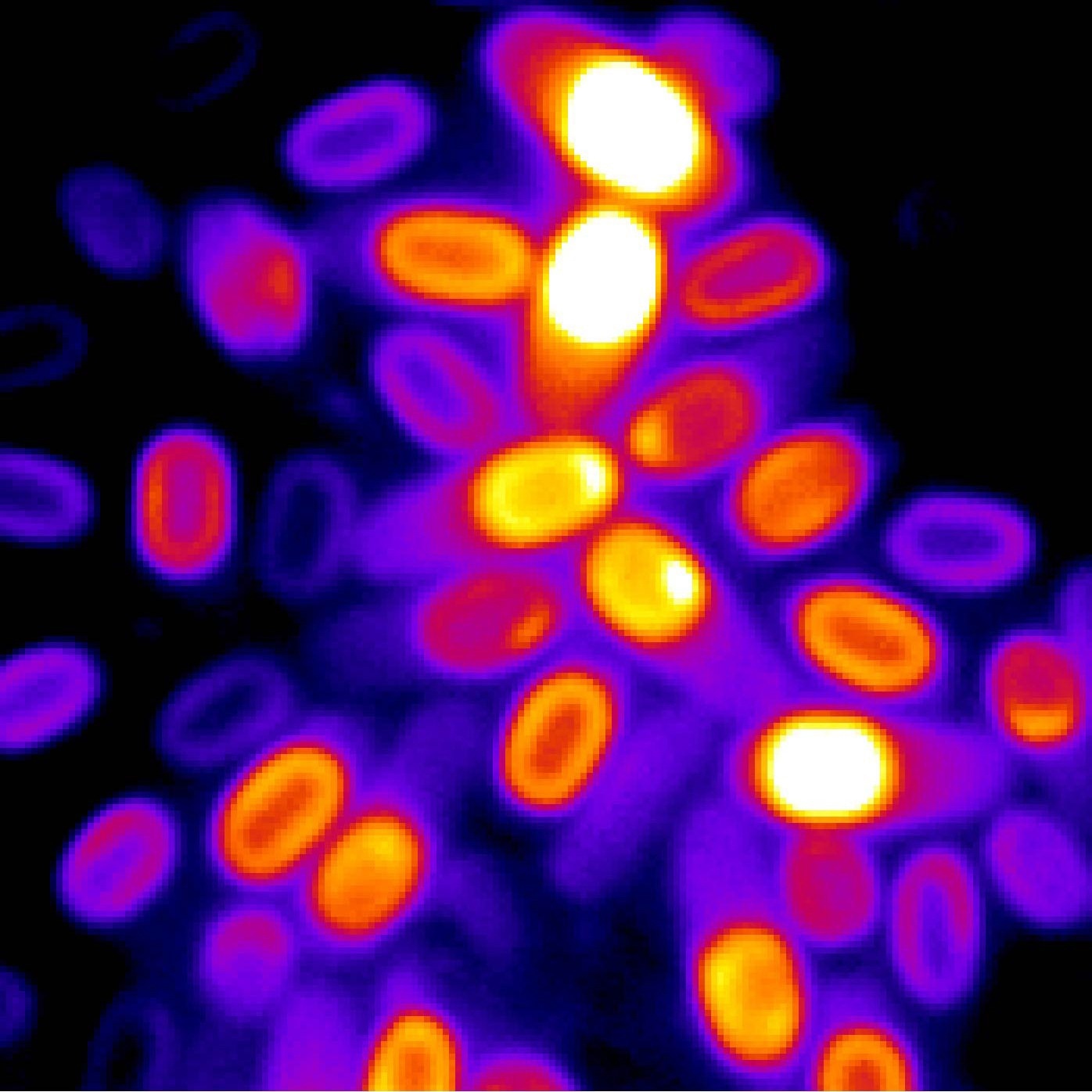When exposed to starvation and stress, certain bacteria enter a dormant state in which life functions cease. These cells, known as spores, can resist punishing extremes of heat, pressure, and even the extreme conditions of outer space by entering a profound hibernation.
 A microscopy image reveals several spores with their electrochemical potential color-coded according to the strength of the signal. Image Credit: Süel Lab—Kaito Kikuchi and Leticia Galera
A microscopy image reveals several spores with their electrochemical potential color-coded according to the strength of the signal. Image Credit: Süel Lab—Kaito Kikuchi and Leticia Galera
When conditions are favorable, spores that have remained dormant for years might awaken and leap back to life in minutes.
Spores rehydrate and resume their metabolism and physiology to wake up. Researchers were unsure whether spores could assess their environment “in their sleep” without waking up. It was unknown how spores respond to ambiguous environmental signals that do not suggest favorable conditions. Would spores simply disregard such diverse environments, or would they take notice?
Recent research published in the journal Science by biologists at the University of California, San Diego, has solved this puzzle. Scientists from the School of Biological Sciences found that spores had an unusual ability to assess their surroundings despite remaining physiologically dead.
Scientists discovered that spores employ stored electrochemical energy to detect whether conditions are favorable for a return to regular operating life, much like a capacitor.
This work changes the way we think about spores, which were considered to be inert objects. We show that cells in a deeply dormant state have the ability to process information. We discovered that spores can release their stored electrochemical potential energy to perform a computation about their environment without the need for metabolic activity.”
Gürol Süel, Professor, Department of Molecular Biology, University of California San Diego
As a survival strategy, most bacterial species generate spores, partially dehydrated cells wrapped by a robust protective layer. This enables them to remain inactive for thousands of years. Because of their extraordinary ability, they pose a threat in the form of bacterial anthrax and contamination risk in medicine and the food industry.
Süel and his co-workers investigated whether latent Bacillus subtilis spores might detect transient environmental signals that were inadequate to cause them to revive. They discovered that spores could keep track of such minor inputs. When the total rose above a predetermined level, they decided to awaken from their latent state and resume biological activity.
The researchers found that spores employ a method known as integrate-and-fire, based on fluxes of potassium ions, for evaluating the environment around them. They developed a mathematical model to assist explain the process. They discovered that spores responded to favorable signals, even those that were fleeting and insufficient to cause an exit from dormancy.
Rather than waking up, spores released part of their stored potassium in response to every small input and then accumulated consecutive favorable signals to evaluate whether conditions were favorable for the exit. Such a cumulative signal processing technique can show whether or not external conditions are favorable, preventing spores from “jumping the gun” into an undesirable world.
The way spores process information is similar to how neurons operate in our brain. In both bacteria and neurons, small and short inputs are added up over time to determine if a threshold is reached. Upon reaching the threshold spores initiate their return to life, while neurons fire an action potential to communicate with other neurons.”
Gürol Süel, Professor, Department of Molecular Biology, University of California San Diego
Surprisingly, spores can integrate signals without using any metabolic energy, although neurons are one of the most energy-dependent cells in the human body.
The investigators believe the new spore information reframes prevalent views about cells in highly inactive states that appear dead. Such discoveries have implications for judging life on objects like meteors in addition to space missions looking for evidence of life.
This work suggests alternate ways to cope with the potential threat posed by pathogenic spores and has implications for what to expect from extraterrestrial life. If scientists find life on Mars or Venus, it is likely to be in a dormant state and we now know that a life form that appears to be completely inert may still be capable of thinking about its next steps.”
Gürol Süel, Professor, Department of Molecular Biology, University of California San Diego
Süel also affiliates with the San Diego Center for Systems Biology, BioCircuits Institute, and Center for Microbiome Innovation.
Watching a dormant spore perform signal integration
Video Credit: University of California San Diego
Source:
Journal reference:
Kikuchi, K., et al. (2022) Electrochemical potential enables dormant spores to integrate environmental signals. Science. doi.org/10.1126/science.abl7484.